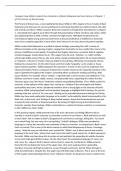Compare how Wilde created the characters of Basil Hallwood and Lord Henry in Chapter 1
of The Picture of Dorian Gray.
The Picture of Dorian Gray, a novel published by Oscar Wilde in 1891, begins in the art studio of Basil
Hallwood as he discusses his current painting of an extremely beautiful man with his friend, the witty
and amoral Lord Henry. Wilde compares these two characters through their introductions in Chapter
1, contrasting them against each other through the presentation of their emotions and values, whilst
also displaying them to hold a similar contempt for high society. With Basil introduced as the
conventional, highly-strung artist and Lord Henry as the personification of indifference, they both
seem to be complete opposites of each other, their interest in art and culture tying them together.
Wilde creates Basil Hallwood as a symbol of intense feelings, presenting him with a variety of
different emotions in the opening chapter, ranging from frustration to love; amidst this, Henry is the
picture of indifference and apathy. Throughout the chapter, Basil uses a semantic field of negative,
emotive language, mainly about his art. This ranges from the verb, ‘imprison,’ to ‘suffer terribly,’
which helps Wilde present him as, like most artists, deeply emotionally tied to his art. Basil attempts
to ‘imprison’ a dream he ‘feared,’ that was linked to his painting, effectively conveying the intense
feelings his art gives him. On the other hand, Lord Henry talks ‘languidly,’ as he smokes a ‘heavy
opium-tainted cigarette.’ Wilde juxtaposes the characters’ manner in this scene to emphasise how
relaxed and listless Henry is compared to Basil; this is further shown by the repeated mentions of his
opium cigarettes throughout the chapter, presenting Henry as pleasure-seeking and living a high
luxury lifestyle. For example, Henry ‘smokes’ a ‘cigarette with a self-conscious and satisfied air.’ The
sibilance used here creates a light, musical, and pleasurable tone, supporting the notion that the
Victorian upper class, like Henry, lived these relaxed and gratifying lifestyles. Thus, Wilde creates his
character as the epitome of the upper class, serving as a critique of the extravagant and shallow
personalities they have. Henry's deadened emotions shine a strong light on the intensity of Basil’s
emotions, Wilde using hyperbolic and exclamatory language to highlight Basil’s feelings. He says his
painting holds the ‘secret of’ his ‘own soul,’ alluding to his potential homosexual feelings for Dorian.
Wilde may have used euphemistic language as he couldn’t write explicitly about homosexuality in his
book, but, as the noun ‘soul’ feelings of deep-rooted passion, shows that homosexual love was just
as powerful and romantic as heterosexual love. By having his highly strung and emotional main
character emulate these feelings, Wilde creates Basil as a symbol of intense emotions, in comparison
to the indifference Henry holds.
In the opening chapter, Wilde presents two of his main characters as holding different values;
morality is central in Basil’s character as amorality is central in Lord Henry’s. Basil and Henry are foils
of each other- this is evident in Basil’s disapproval of Lord Henry’s marriage, telling him, ‘You never
say a moral thing, but you never do a wrong thing.’ In Basil’s dialogue, Wilde uses paradoxical
language to convey the amorality and complexity of Henry’s character, in comparison to Basil’s more
clear-cut morals. This is seen in the direct manner in which Basil disapproves of Henry’s marriage,
saying, ‘I hate the way you talk about your married life.’ Wilde’s use of direct speech and emotive
language in the verb ‘hate,’ shows how much more clear Basil’s good morals are. As Basil represents
the artist, Wilde may have done this to praise art and aesthetics by presenting his artistic character
as one who holds good distinct values. On the other hand, the paradoxical language of ‘never say,’
and ‘never do,’ makes it hard to discern where Henry’s values lie. Furthermore, Wilde presents
Henry like this to display the irony of the upper class, who were supposed to be upstanding
members of society with high morals but, as seen through Lord Henry, did not follow through in
what they believed in. Despite this, the upper class still held major influence. This is seen at the end
of the chapter where Basil begs Henry not to ‘influence’ Dorian, his desperate manner evident from




